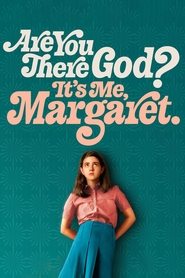In writing the following, I must stress that I do not at all believe that strict fidelity to the source material is correlated with good cinema. Yet it is difficult to avoid that the most engaging aspects of this "sweet-natured, undemanding, oddly inconsequential movie" (Peter Bradshaw) arise from the differences between the two texts and what that implies historically and sociologically.
No doubt many of these are simple aesthetic choices to match contemporary trends. Margaret is more awkward in the original book, and the tone is much more irreverently comedic in the film. In this way and others, you can feel the influence of five decades of well-crafted Young Adult fiction and films made for that demographic (Eighth Grade, The Fault in Our Stars, etc.). The fact that this 'young adult' industry was in part created by Blume's 1970 book in the first place simply makes this 'boomerang effect' more interesting, if not ironic.
Where to begin. Just like in the book, the concept of 'class' is entirely absent from the film's narrative. In fact, money is hardly registered at all, with jobs being either unspecific or more akin to hobbies that require to you leave the house in the morning. More interestingly, however, is that the filmmakers have attempted to address the lack of racial diversity in Blume's book. Yet this results in some inadvertently surreal comedy in the film, such as when the Black girl in the group says that she doesn't recognise the women in Playboy (!). The film plays this line in an entirely deadpan manner, as if completely oblivious to the reasons why she might not a) have access to this magazine; and b) why she doesn't 'recognise' any of the models therein. If anything, this simply makes it more evident that the filmmakers have confused numerical representation in the cast list with narrative representation. Also removed from this same scene was a stark moment of fat-shaming that sticks out in the book, despite them eating the same cookies that spurred the comment in the original. Perhaps it got removed in the edit after audience testing. In contrast to that omission, though, it is worth remarking that they retained the persistent slut shaming of their classmate. In fact, they actually doubled down on its severity, not simply in the way the camera seemed interested in her (more developed) body, but also in that the film removed the line that makes it clear that the stories about her "going behind the bikesheds" with oother boys were pure fabrication by Nancy.
There is, alas, the now-tediously commonplace 1970s set dressing. By this, I mean that every object is depicted in pseudo-drably muted colours, yet everything is antiseptically clean that subliminally prevents the viewer from believing that these are authentic, lived-in places. In this respect, I could have done without the 1970s egg-shaped chair, and the needledrops of contemporary hits are a little on the nose as well. (As an aside, I often wonder whether our misplaced nostalgia for the 1970s is, in part, a nostalgia for a time that wasn't itself steeped in nostalgia for a previous time, and one would listen to the music and culture of the time.) The subplot about Margaret's mother's depression seems to have gotten lost in translation as well. Indeed, both of her parents seem to be annoyingly chirpy, despite being estranged from one set of in-laws due to the mixed religious marriage. In the book, both of these elements are far less jarring, as the text adopts something of the narrow and self-centred worldview of a child. Yet in cinematic form, one can't help but feel bewildered—almost angry—that this instance of blatant anti-Semitism is not addressed at all. "Hellooo, her parents despise you for being Jewish, and your response is to fret about running out of small talk…?"
One last thing. The search for a personal God is the ostensible narrative or tension of the story, but the original book was written in an increasingly secular decade where all kinds of convictions (eg. nationalism, church-going, summer-of-love) were in stark decline. The book could be seen as part of a broader question in the West about what to fill this spiritual gap. So whilst t might be 'timely' or 'urgent' to make this film in an increasingly evangelical 2020s, what exactly is this adaptation telling us about today that we don't already know?
Amy Nicholson's generally negative review for Variety makes some similar observations about the elisions in this "nostalgia hit with saccharine artificiality", suggesting that:
The too-brief centerpiece is a class film strip on “menstroo-ation,” as over-enunciated by its host. The film snips out Margaret’s outrage to discover that the lecture was “like one big commercial” for a line of feminine products, vowing to never buy the brand when her period starts. Why not let kids today absorb a little of Margaret’s anti-corporate cynicism?
(Amy also has a good line on Margaret's Dad, too, who "wears retro fatherhood like a Halloween costume, sounding so insincere as he professes his eagerness to mow a lawn that we’re tempted to add subtext to his thin role".)

